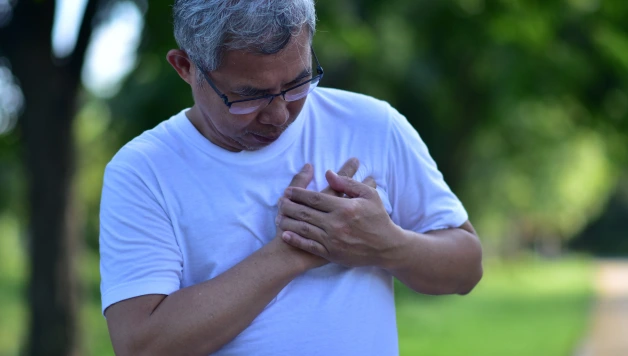Key Takeaways:
- Breast cancer can affect men, though it is less common than women.
- Genetic mutations and hormonal imbalances can contribute to breast cancer in males.
- Men should be vigilant about recognizing signs like lumps, nipple changes, or skin dimpling.
- Early detection through regular check-ups is essential for better outcomes in male breast cancer cases.
Breast cancer is a topic that often conjures up images of women undergoing screenings, treatments, and support. However, a common misconception is that breast cancer is exclusive to women. Contrary to this belief, breast cancer can also affect men.
While it is true that breast cancer in men is relatively rare compared to women, it is essential to shed light on this often-overlooked aspect of breast health. In this article, we will explore the question, “Can men get breast cancer?”. Further, we’ll delve into the causes, risk factors, symptoms, diagnosis, and treatment options for breast cancer in men.
Understanding Breast Cancer in Men:
Breast cancer occurs when abnormal cells in the breast tissue grow uncontrollably. Though it is significantly less prevalent in men, it is vital to be aware of its existence. Men possess a small amount of breast tissue, primarily behind the nipples, which is susceptible to cancerous growth.
Can men get breast cancer?
Breast cancer is commonly associated with women. But men can also develop this condition. By raising awareness about this less-discussed topic, we aim to promote early detection, timely intervention, and a better understanding of breast health for men. Let’s uncover the facts and break the misconception surrounding breast cancer in men.
Causes of Breast Cancer in Men
Men, like women, also have various causes and risk factors associated with the condition. Before delving into the topic further, it is necessary to comprehend the factors that contribute to breast cancer in men.
Genetic Mutations
Men can inherit specific genetic mutations, such as BRCA1 and BRCA2, which increase the chance of cancer. Further, they are associated with breast cancer development in both men and women.
Hormonal Imbalances
Men have small amounts of estrogen and progesterone. These are the hormones that can impact breast tissue growth and may contribute to the development of breast cancer.
Family History
A family history of breast cancer, in males or females, can increase the likelihood of developing breast cancer.
Age
As men age, the risk of cancer tends to increase. Most cases of breast cancer in males occur after the age of 60.
Radiation Exposure
Exposure to radiation therapy near the chest area in previous years is responsible for men’s risk of breast cancer.
Medical Conditions
Men with certain medical conditions, such as Klinefelter syndrome (a genetic disorder affecting male hormone production) and liver diseases, may have a higher risk of developing cancer.
It’s important to note that these factors can lead to breast cancer. But, most men with these risk factors will not develop cancer. Regular check-ups and early detection are essential for prompt diagnosis and better outcomes. By staying informed and vigilant, men can take charge of their breast health and promote overall well-being.
The Role of Hormones:
Hormones are crucial chemical messengers that regulate various bodily functions, including growth and development. In women, hormonal changes during menstrual cycles and menopause can influence breast cancer risk. Similarly, hormonal fluctuations in men can also impact their breast health.
Menopause and Breast Cancer Risk:
In women, menopause marks the natural cessation of menstrual periods, leading to a decline in hormone levels, particularly estrogen and progesterone. After menopause, the chances of breast cancer increase due to hormonal changes.
While men do not experience menopause, their hormone levels can fluctuate with age. As men grow older, testosterone levels may decline, leading to a relatively higher proportion of estrogen in their bodies. These hormonal changes, though not as dramatic as those in menopause, can still affect the breast tissue’s growth and influence the risk of breast cancer.
Signs and Symptoms in Men:

Breast cancer may present with symptoms similar to those experienced by women. Some crucial ones are:
Presence of a painless lump or thickening in the breast area:
One of the most common signs of breast cancer is the discovery of a painless lump or thickening in the breast tissue. This lump may be felt directly under the nipple or surrounding areas.
Changes in the nipple, such as inversion or discharge:
Men with breast cancer may notice changes in their nipples, such as it becoming inverted (turned inward) or experiencing discharge, which can be clear, bloody, or another colour.
Dimpling or puckering of the skin surrounding the breast:
Breast cancer may cause alterations in the appearance of the skin on the breast. Dimpling or puckering of the skin, similar to the texture of an orange peel, may be observed.
Swelling or lumps under the arm, indicating possible spread to the lymph nodes:
If breast cancer has progressed and spread, it may affect the nearby lymph nodes under the arm, leading to swelling or the presence of lumps.
Men must be aware of these signs and symptoms and seek medical attention if abnormalities are noticed in their breast area. Early detection and timely medical intervention can significantly improve the prognosis and outcomes for men with cancer.
Treatment Options for Men with Breast Cancer:
The treatment options for breast cancer in men are similar to those for women and depend on various factors, including the stage of cancer, the type of breast cancer, and the individual’s overall health. Common treatment modalities include:
Surgery:
The primary treatment for breast cancer involves surgical removal of the tumour. In some cases, a mastectomy (removal of the entire breast) may be necessary; in others, a lumpectomy (removal of the tumour and surrounding tissue) may be sufficient.
Radiation Therapy:
Radiation therapy employs high-energy rays to target and destroy cancer cells. This treatment is commonly used after surgery to eradicate any remaining cancer cells and lower the chance of cancer recurrence.
Chemotherapy:
Chemotherapy involves the entails of powerful drugs to destroy cancer cells. It is typically recommended for men with aggressive breast cancer or when it has spread to other body parts.
Hormone Therapy:
Since some breast cancers in men are hormone receptor-positive (meaning they rely on hormones to grow), hormone therapy may block the effects of hormones on cancer cells and slow down tumour growth.
Targeted Therapy:
Targeted therapy specifically targets cancer cells while sparing healthy cells. It works by interfering with specific molecules involved in cancer cell growth and division.
Clinical Trials:
Participation in clinical trials allows men with breast cancer access to innovative treatments still undergoing research and development.
Emotional and Psychological Support:
Receiving a breast cancer diagnosis can be emotionally and psychologically difficult for individuals, irrespective of their gender. Men with breast cancer may encounter unique emotional hurdles and the prevailing perception that breast cancer primarily affects women.
Emotional and Psychological Support:
Receiving a breast cancer diagnosis can be emotionally and psychologically difficult for individuals, irrespective of their gender. Men with breast cancer may encounter unique emotional hurdles and the prevailing perception that breast cancer primarily affects women.
Preventing Breast Cancer in Men:
While some risk factors for breast cancer in men, such as genetics and age, are beyond our control, there are steps individuals can take to reduce their risk:
Regular Exercise:
Regular physical activity can support weight maintenance and lower the risk of breast cancer.
Healthy Diet:
A nutrient-based diet rich in fruits, vegetables, and whole grains can enhance overall health and well-being.
Limiting Alcohol Consumption:
Heavy alcohol consumption may lead to a higher risk of breast cancer in both men and women. Moderation is key.
Avoiding Tobacco:
Giving up smoking is crucial for maintaining overall health and can also aid in reducing the risk of cancer.
Conclusion
Breast cancer is not exclusively a women’s health issue. While it is true that breast cancer in men is relatively rare compared to women, it can and does occur. Understanding the risk factors, signs, and symptoms of breast cancer in men is crucial for early detection and successful treatment.
If any unusual changes are noticed in the breast area, seeking prompt medical advice is essential. Awareness and timely action can significantly impact the fight against breast cancer, regardless of gender. Let us stay informed and take charge of our health to ensure a brighter and healthier future.









